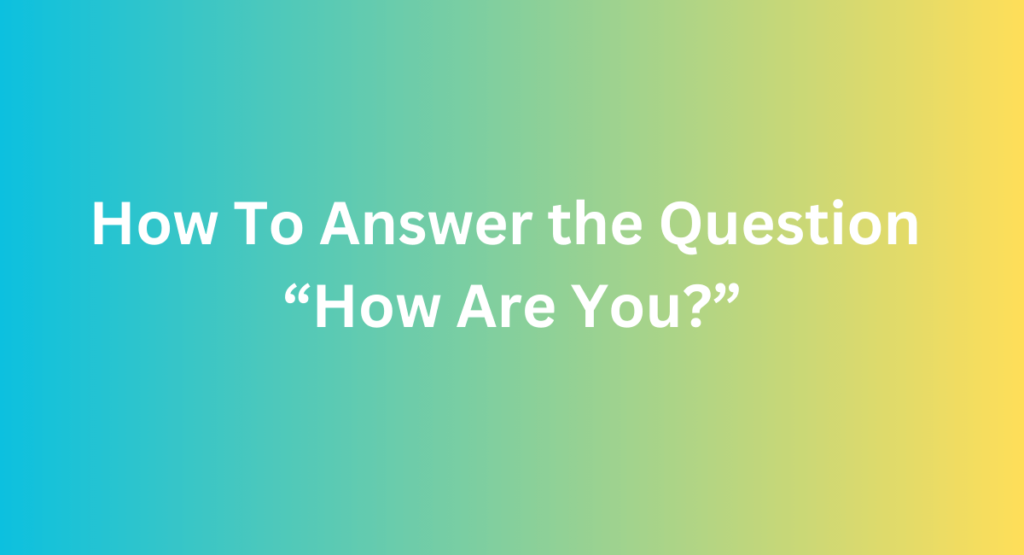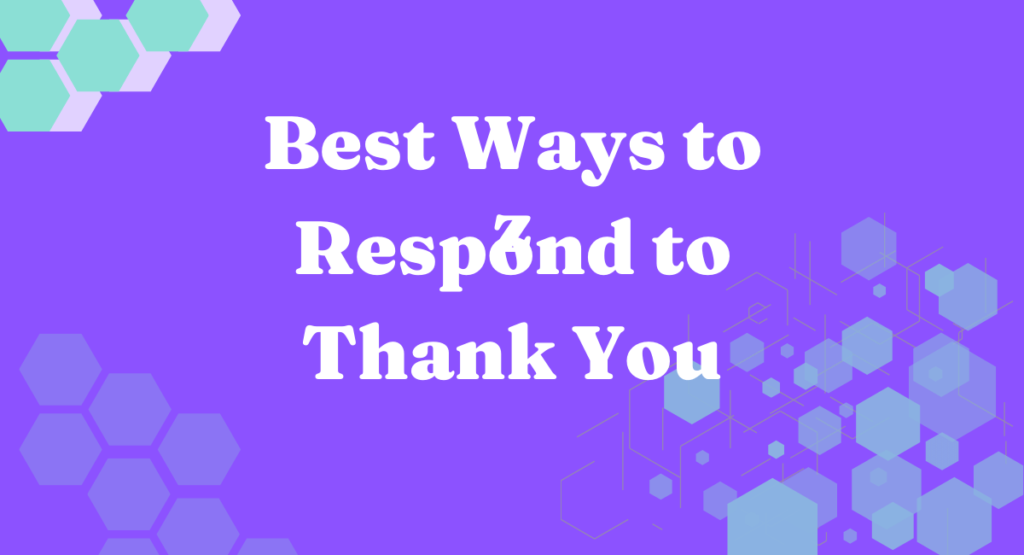Yes, it is possible to give the best reply by speaking directly, ensuring attention, allowing others to speak, and encouraging responses. Giving the best reply in a conversation is crucial for effective communication.
It involves speaking directly and clearly, ensuring that your audience is paying attention to avoid repetition. Additionally, it is important to recognize if someone else wants to speak and provide them with the opportunity to share their thoughts. An effective reply allows for a two-way conversation, where both parties can respond and engage with the topic at hand.
By following these principles, you can ensure that your replies are impactful and facilitate meaningful discussions.
Some Positive Reply It is Possible?
Certainly! It seems like you’re looking for responses to the question “Is it possible?” Here are 30 possible replies:
- Yes, it’s possible.
- It can be done.
- Certainly, there are ways to make it happen.
- Indeed, it’s within the realm of possibility.
- Affirmative, it’s entirely doable.
- Of course, it’s achievable.
- Positively, there are ways to make it work.
- There’s a chance for success.
- Without a doubt, it’s possible.
- Certainly, with the right approach.
- Yes, there are potential pathways.
- Given the right conditions.
- Of course, it’s within reach.
- Indeed, it’s feasible.
- Without question, it can be accomplished.
- Affirmative, under the right circumstances.
- Certainly, with the proper resources.
- Positively, with effort and determination.
- If the necessary steps are taken.
- Yes, there’s a possibility.
- Certainly, with the right strategy.
- Definitely, with the proper planning.
- Without a doubt, it’s within the realm of possibility.
- Of course, it’s realistic.
- Yes, under the right conditions.
- Absolutely, with the right mindset.
- Certainly, given the right opportunities.
- Affirmative, it’s not out of the question.
- Positively, it’s feasible.
- Without question, it’s a potential outcome.
Some Negative Response It is Possible?
When you put your ideas, products, or services out into the world, it’s natural to wonder, “Some negative response – is it possible?” The reality is that in any endeavor, there is always the potential for encountering some negative feedback or response. However, it’s important to view this as an opportunity for growth and improvement rather than a setback.
By addressing and learning from negative responses, you can refine your offerings and enhance your overall performance. Embracing the possibility of some negative response can ultimately lead to a more resilient and successful outcome.
Here are some Negative Responses It is Possible?
I’m afraid that’s not possible at the moment.
Unfortunately, that won’t be feasible.
I’m sorry, but that’s beyond our capabilities.
Regrettably, we’re unable to accommodate that request.
I’m afraid that’s not within our capacity.
Unfortunately, we don’t have the resources for that.
I’m sorry, but that’s out of the question.
It’s not possible under the current circumstances.
I’m afraid I can’t make that happen.
Unfortunately, we’re unable to proceed with that.
I’m sorry, but that’s not something we can do.
Regrettably, we’re unable to fulfill that request.
I’m afraid that’s not achievable right now.
Unfortunately, that’s not something we can support.
I’m sorry, but that’s not feasible at this time.
Polite Response It is Possible?
When it comes to communication, the power of a polite response cannot be overstated. In today’s fast-paced and often impersonal digital world, the ability to craft a polite and respectful response is not only possible but essential for building strong relationships and fostering positive interactions. Whether in business or personal communication, mastering the art of a polite response is a valuable skill that can set you apart and leave a lasting impression.
Here are ten polite responses:
Certainly, I’ll do my best.
I’ll make every effort to accommodate that.
I’ll see what I can do to make it happen.
I’ll explore the options and get back to you.
I’ll consider that.
I’ll certainly keep that in mind.
I’ll try to find a solution that works for everyone.
I appreciate your request, and I’ll handle it with care.
I’ll prioritize this and keep you updated.
Thank you for bringing that to my attention; I’ll address it accordingly.
Friendly Response It is Possible?
Looking for ways to provide friendly responses to your customers or clients? You’re in the right place! Providing a friendly response can go a long way in building trust and strengthening relationships. It’s possible to provide a friendly response in just about any situation, whether you’re dealing with a difficult customer or handling a complex issue. In this article, we’ll explore some tips and techniques for providing a friendly response that will leave your customers feeling satisfied and valued. So, let’s get started on the journey of providing a Friendly Response – It is Possible!
Sure thing! I’ll see what I can do.
You got it! I’ll make it happen.
Of course! I’m on it.
No problem at all! I’ll take care of it.
Yep, consider it done!
Definitely! I’ll get right on that.
You bet! I’ll see what I can work out.
Absolutely! I’ll see what I can arrange.
Yup, I’ll see what’s possible.
Absolutely! Let’s make it happen
Understanding Effective Responses
When it comes to giving the best reply, it is important to speak directly and clearly, ensuring that the listener is paying attention. Additionally, allowing others to speak and responding to their input helps create an effective conversation.
Importance Of Effective Responses
Effective responses are crucial in any communication, be it a conversation, an email, or a blog post comment. They play a significant role in establishing clear and concise communication between individuals. When you respond effectively, you ensure that your message is understood and well-received by the recipient. It helps to avoid misinterpretations and fosters a positive and productive atmosphere. Effective responses also demonstrate respect and empathy toward the other person’s perspective. Let’s explore the importance of effective responses in more detail.
Attributes Of Effective Responses
When crafting an effective response, certain attributes can enhance the impact and effectiveness of your message. Let’s take a look at some of these attributes:
1. Clarity: Effective responses are clear and concise, leaving no room for ambiguity. They provide the necessary information or answers while avoiding unnecessary details or jargon. By being clear in your response, you ensure that your message is easily understandable and reduces the chances of misunderstandings.
2. Responsiveness: An effective response is timely and addresses the specific concerns or questions raised. It shows that you value the other person’s input and are actively engaged in the conversation. Being responsive also means acknowledging any emotions expressed and providing appropriate support or validation.
3. Flexibility: Effective responses demonstrate a willingness to consider alternative perspectives or options. They embrace open-mindedness and are open to constructive discussions and feedback. Being flexible in your response allows for collaboration and promotes problem-solving.
4. Respect: Respecting the other person’s perspective is crucial in effective responses. It involves avoiding personal attacks or derogatory language and instead focusing on the topic at hand. Respectful responses create a positive environment for communication and encourage further engagement.
5. Empathy: Effective responses show empathy towards the other person’s feelings or situation. They consider the emotional aspects of the conversation and demonstrate understanding and compassion. By incorporating empathy into your response, you build trust and foster stronger relationships.
In conclusion, understanding the importance of effective responses and implementing the attributes mentioned above can significantly enhance your communication skills. By crafting clear, responsive, flexible, respectful, and empathetic responses, you can ensure that your message is well-received and contributes to meaningful conversations.
Mastering Communication Skills
Effective communication is essential in all aspects of life, whether it be personal relationships, professional settings, or everyday interactions. Mastering communication skills is a valuable asset that can help you express yourself clearly, build strong connections, and resolve conflicts effectively. In this blog post, we will explore three key aspects of communication that can greatly improve your ability to connect and engage with others: clear and direct communication, active listening, and allowing others to speak.
Clear And Direct Communication
Clear and direct communication is crucial in conveying your message effectively. By using concise and straightforward language, you ensure that your message is easily understood by the recipient. Avoid using jargon or complicated terminology that may confuse the listener. Instead, opt for simple and precise wording that gets straight to the point. When you respond to someone, speak directly and clearly, ensuring that they are paying attention to you. By doing so, you can avoid misunderstandings and the need for repetitive explanations.
Active Listening
Active listening is a fundamental skill that allows you to fully understand and engage with the speaker. It involves not only hearing the words being spoken but also paying attention to the speaker’s non-verbal cues and emotions. Maintain eye contact, nod your head, and provide verbal affirmations to show the speaker that you are actively listening. Avoid interrupting or formulating your response while the speaker is talking. Instead, focus on understanding their perspective and empathizing with their thoughts and feelings. By actively listening, you can foster effective communication and build stronger connections with others.
Allowing Others To Speak
Allowing others to speak is a vital aspect of effective communication. It is important to create a space where everyone feels comfortable and encouraged to express their thoughts and opinions. Avoid dominating conversations or interrupting others. Instead, practice patience and actively invite others to share their perspectives. By allowing others to speak, you show respect for their ideas and foster a collaborative and inclusive environment. Remember that effective communication is a two-way street, and allowing others to speak ensures that everyone’s voice is heard.
In conclusion, mastering communication skills involves clear and direct communication, active listening, and allowing others to speak. By honing these skills, you can enhance your ability to connect, engage, and build strong relationships with others.
Handling Difficult Questions
When it comes to handling difficult questions, it’s important to respond with honesty and clarity. Difficult questions can often catch us off guard, but with the right approach, we can navigate them smoothly. In this section, we will explore three effective strategies for handling difficult questions: responding honestly, seeking clarification, and asking for more time.
Responding Honestly
One of the best ways to handle difficult questions is by responding honestly. Instead of trying to dodge or evade the question, it’s better to own up to not having all the answers. By being honest, you can build trust and credibility with your audience. Responding honestly also shows that you are open to learning and willing to admit when you don’t know something.
For instance, if you are asked a question and you do not know the answer, you can respond by saying, “To be honest, I don’t have the answer to that question at the moment. However, I am interested in learning more about it. Would you like me to follow up with you later?” This response demonstrates honesty and a proactive approach to finding the information.
Seeking Clarification
Another effective strategy for handling difficult questions is to seek clarification. Sometimes, questions can be ambiguous or confusing, making it challenging to give a precise answer. In these situations, it’s essential to ask for more details or ask the questioner to rephrase the question.
For example, if you find yourself struggling to understand a question, you can say, “I’m not quite sure I understand what you’re asking. Could you please clarify or provide more context?” Seeking clarification ensures that you fully comprehend the question before attempting to answer it, leading to a more accurate and satisfactory response.
Asking For More Time
When faced with a difficult question, it is perfectly acceptable to ask for more time to gather your thoughts and provide a well-thought-out answer. This approach shows that you respect the question and want to provide a thorough response rather than rushing into an inadequate reply.
You can ask for more time by saying, “That’s a great question. Let me take a moment to consider it and gather my thoughts. Is it alright if I get back to you with a detailed response later?” Asking for more time allows you to research, consult colleagues, or reflect on the question, resulting in a more comprehensive and informed reply.
In conclusion, handling difficult questions requires responding honestly, seeking clarification, and, when necessary, asking for more time. By utilizing these strategies, you can navigate challenging inquiries with confidence and professionalism.
Best Practices For Specific Scenarios
Discover the best reply for any scenario with our comprehensive guide. Learn how to respond effectively and confidently, ensuring your message is clear and concise. From giving honest answers to clarifying questions, we’ve got you covered.
Best Practices for Specific Scenarios
Responding When Unsure
When faced with uncertainty, it’s essential to respond tactfully and honestly. Consider using phrases like “I’m not entirely sure, but I’ll find out and get back to you.” It’s crucial to maintain authenticity while avoiding misleading information.
Answering ‘How Are You?’
Responding to “How are you?” requires a balanced approach. Express positivity with responses such as “I’m doing well, thank you” or “Fantastic!” to convey enthusiasm. It’s important to keep the response brief and maintain an optimistic tone.
Replying to ‘Is it possible?’ Type Questions
When asked “Is it possible?” type questions, it is advisable to provide a direct yet informative reply. Offer a concise “Yes, it’s possible. You can do X or Y” while ensuring the response is relevant to the specific inquiry. This approach provides clarity without overwhelming the recipient with excessive details.
Dealing with Timing-related Questions
When confronted with timing-related questions such as “Is it the right time to talk to you?” respond respectfully and considerately. A suitable reply could be “Yes, this is a suitable time. What’s on your mind?” This ensures openness to communication while acknowledging the importance of the timing.
Remember, when uncertain, it is okay to respond truthfully. Maintaining positive and authentic interactions is key to effective communication in various scenarios.
Improving Question Response Skills
Enhancing your question-response skills is crucial in various aspects of life, whether it’s in a professional setting, social interactions, or personal relationships. Effective communication is foundational in ensuring that your responses are clear, concise, and valuable. To improve your question response skills, consider focusing on the following areas:
Practicing Effective Communication
Clear and concise communication forms the bedrock of a good question response. When responding to queries, speak directly and clearly to ensure your message is understood. It’s essential to engage the individual’s attention to minimize the need for repeated explanations. Furthermore, acknowledge and respect others’ desire to be heard by providing them with the space to express their thoughts.
Seeking Feedback
Seeking feedback on your responses can be invaluable in identifying areas for improvement. Encourage individuals to provide a constructive critique of your response style, helping you gain insight into potential enhancements. Constructive feedback facilitates self-awareness and improvement.
Continual Learning And Improvement
Recognizing that learning is an ongoing process is key to enhancing question-response skills. Adopt a growth mindset and be open to learning from every response experience. Continual learning and striving to improve your reaction to queries will solidify your expertise in question response.
Frequently Asked Questions For Best Reply Is It Possible
How Do You Give The Best Reply?
To give the best reply, speak directly and clearly. Make sure the person is paying attention so you don’t have to repeat yourself. Allow others to speak and respond to what you’ve said.
What To Reply When You Don’t Know What To Reply?
When you don’t know what to reply, be honest and say, “To be honest, I don’t know the answer, but I’m interested in learning. ” Clarify the question by saying, “I don’t understand. Could you rephrase it, please? ” Remember to stay calm and take a deep breath before responding.
How Are You The Best Response?
To provide the best response, speak directly and clearly. Ensure the listener is attentive, allowing them to respond. Greet positively with “Great,” or “Fantastic. ” Encourage conversation by asking, “What’s new with you? “
How To Ask How Is Everything Going?
Simply ask, “How’s everything? ” In a casual and friendly manner. Be positive and enthusiastic in your response.
Conclusion
Giving the best reply is indeed possible. By speaking clearly and directly, paying attention to the person you’re responding to, and allowing space for others to speak, you can effectively communicate your message. If you’re unsure of how to reply, it’s better to be honest and ask for clarification.
Remember, a positive and enthusiastic attitude goes a long way in delivering the best response.



